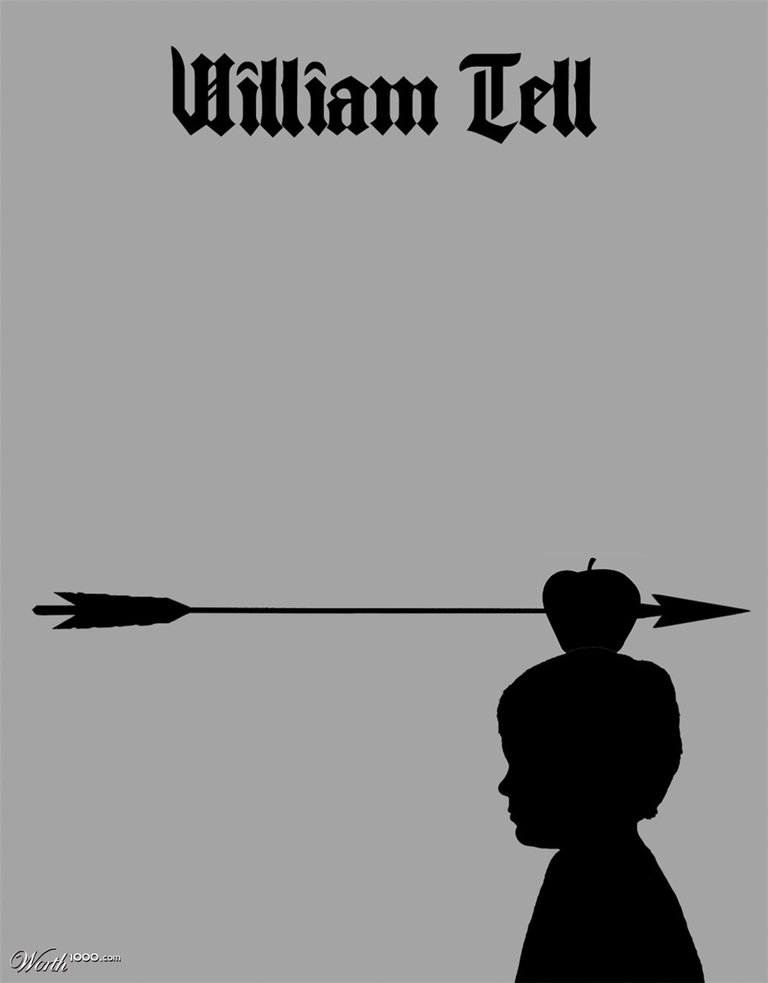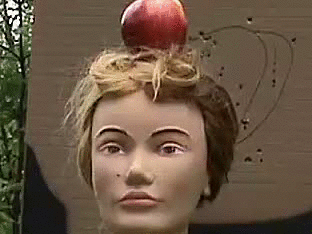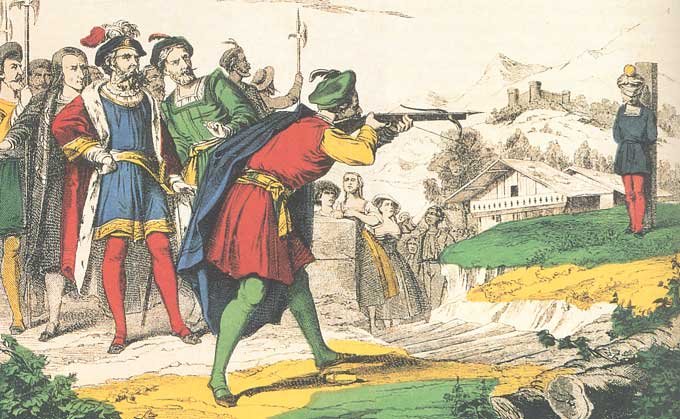


The earliest known occurrence of the motif is from the 12th century, in Saxo Grammaticus' version of the story of Palnatoki, whom he calls Toko (Gesta Danorum Book 10, chapter 7).
Toko, who had been for some time in the service of the king Harald Bluetooth, had, by the deeds in which he surpassed his fellow-soldiers, made several enemies of his virtues. One day, when he had drunk rather much, he boasted to those who were at table with him, that his skill in archery was such that he could hit, with the first shot of an arrow, ever so small an apple set on the top of a wand at a considerable distance. His detractors hearing these words, lost no time in conveying them to the ears of the king. But the wickedness of the prince speedily conveyed the confidence of the father to the peril of the son, ordering the sweetest pledge of his life to stand instead of the wand, from whom, if the utterer of the boast did not strike down the apple which was placed on him at the first shot of his arrow, he should with his own head pay the penalty of his idle boast. When the youth was led forth, Toko carefully admonished him to receive the whiz of the coming arrow as steadily as possible, with attentive ears, and without moving his head, lest by a slight motion of his body he should frustrate the experience of his well-tried skill. He made him also, as a means of diminishing his apprehension, stand with his back to him, lest he should be terrified at the sight of the arrow. He then drew three arrows from his quiver, and the first he shot struck the proposed mark. Toko then being asked by the king why he had taken so many arrows out of his quiver, when he was to make but one trial with the bow, "That I might avenge on thee," said he, "the error of the first by the points of the others, lest my innocence might hap to be afflicted and thy injustice to go unpunished!"
Das früheste bekannte Vorkommen des Motivs stammt aus dem 12. Jahrhundert, in der Saxo Grammaticus 'Version der Geschichte von Palnatoki, die er Toko nennt (Gesta Danorum Buch 10, Kapitel 7).
Toko, der seit einiger Zeit im Dienst des Königs [Harald Bluetooth] gewesen war, hatte durch die Taten, in denen er seine Mit-Soldaten übertraf, mehrere Feinde seiner Tugenden gemacht. Eines Tages, als er viel getrunken hatte, rühmte er sich an die, die mit ihm im Tisch waren, dass seine Geschicklichkeit im Bogenschießen so war, dass er mit dem ersten Schuss eines Pfeils einen so kleinen Apfel auf die Oberseite stellen konnte eines Zauberstabes in beträchtlicher Entfernung. Seine Gegner, die diese Worte hörten, verlor keine Zeit, sie zu den Ohren des Königs zu vermitteln. Aber die Schlechtigkeit des Fürsten vermittelte schnell das Vertrauen des Vaters auf die Gefahr des Sohnes und befahl dem süßesten Pfand seines Lebens, anstatt des Zauberstabs zu stehen, von wem, wenn der Oberbefehlshaber den Apfel nicht schlagen würde wurde bei dem ersten Schuss seines Pfeils auf ihn gelegt, er sollte mit seinem eigenen Kopf die Strafe seines Leerlaufs bezahlen. . . . Als der Jüngling hervorgegangen war, ermahnte ihn Toko sorgfältig, den Pfeil so schnell wie möglich mit aufmerksamen Ohren zu empfangen und ohne seinen Kopf zu bewegen, damit er durch eine leichte Bewegung seines Körpers die Erfahrung seines Brunnens nicht vereiteln würde - Geschicklichkeit. Er machte ihn auch, als Mittel zur Verringerung seiner Besorgnis, mit dem Rücken zu ihm zu stehen, damit er nicht vor dem Anblick des Pfeils erschrecken sollte. Er zog dann drei Pfeile von seinem Köcher, und der erste, den er schoss, schlug die vorgeschlagene Marke. Toko, der dann von dem König gefragt wurde, warum er so viele Pfeile aus seinem Köcher genommen hatte, als er nur einen Prozeß mit dem Bogen machen sollte, "das könnte ich dich rächen", sagte er, "der Fehler der ersten durch die Punkte der anderen, damit meine Unschuld nicht geplagt werden kann und deine Ungerechtigkeit ungestraft zu gehen.

Source: https://en.wikipedia.org/wiki/Shooting_an_apple_off_one%27s_child%27s_head
Not indicating that the content you copy/paste is not your original work could be seen as plagiarism.
Some tips to share content and add value:
Repeated plagiarized posts are considered spam. Spam is discouraged by the community, and may result in action from the cheetah bot.
Creative Commons: If you are posting content under a Creative Commons license, please attribute and link according to the specific license. If you are posting content under CC0 or Public Domain please consider noting that at the end of your post.
If you are actually the original author, please do reply to let us know!
Thank You!
The story was translated from English to German. Story has no copyright laws.
This story is about German history and German knowledge.
The story was stolen from Germany to Switzerland. from a German historical writer, and is public knowledge.
Under the Versailles treaty. All German History Literature, has no copyright validation.
This was proven in a court of law in German courts in August 1983.
I was not doing copyright I was translating. There is a big difference.
If you would like me to remove this posting. I will
P.S. how about removing all the porn off this site that is all copyrighted.